Peak Design Outdoor Sling 7L Review
The compressible Peak Design Outdoor Sling 7L quickly turns into a padded camera sling, so it’s a dual-purpose bag for professional and amateur photographers.
Our Verdict
Save time. Get access to brief summaries of our reviews so you can browse and make decisions more efficiently.
Pros
- The materials are very lightweight, durable, and highly water-resistant
- Compatible with a Peak Design Camera Cube for use as a photography sling
- as external attachment points to carry larger gear, like an umbrella
Cons
- Without the camera cube inside, the materials lack structure, which can lead to sagging
- The strap is ambidextrous; however, flipping it isn’t very easy
- Smaller items aren’t as easy to attach to the bottom cinch cords
Technical Details
-
Capacity
7l
-
Weight (lb)
0.74 lb (0.3 kg)
-
Dimensions
8.5 in x 13 in x 5.5 in (21.6 x 33 x 14 cm)
-
Notable Materials
Ripstop Nylon, Recycled Materials, Meets bluesign® Criteria, Woojin Hardware
-
Manufacturing Country
Indonesia
-
Warranty Information
Full Review
Get up to 10% off Peak Design • Join Pack Hacker Pro
The Peak Design Outdoor Sling 7L is a lightweight, durable, and versatile sling that can handle your daily carry and some camera gear. Still, a few features, like the flimsy exterior and the need for a separate camera cube, may deter some travelers. Is it for you? Let’s dive in and find out!
External Components
The primary material used on this sling is Terra Shell 210D ripstop nylon, which is 100% recycled, bluesign® approved, and PFAS-free, which is a solid shout from a sustainability perspective. The material is lightweight but durable, though it lacks structure, but we’ll get into that soon enough.
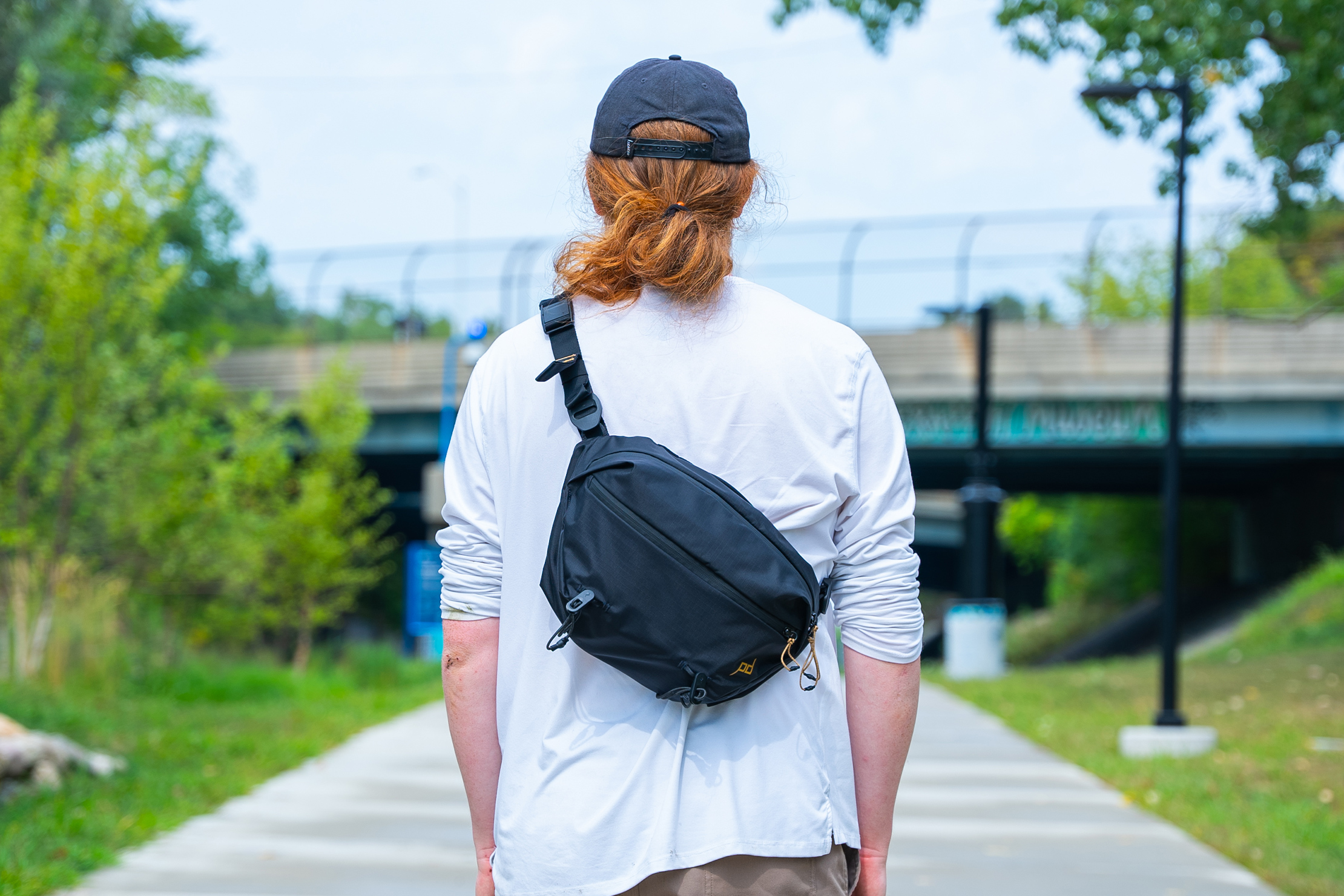
The zippers aren’t branded, though we’ve dealt with these before from Peak Design. We feel similarly about these as we have in the past—we haven’t had any issues to report with them so far, though we generally like to see a brand like YKK here.
The buckles are from Woojin, one of the best brands in the business. They work as you’d expect them to and feel robust enough to handle rugged adventures, which is what this sling was designed to do.
The sling expands from 5 to 7.5 liters, which is pretty rad if you’re someone with a fluctuation gear loadout. How does it work, though?
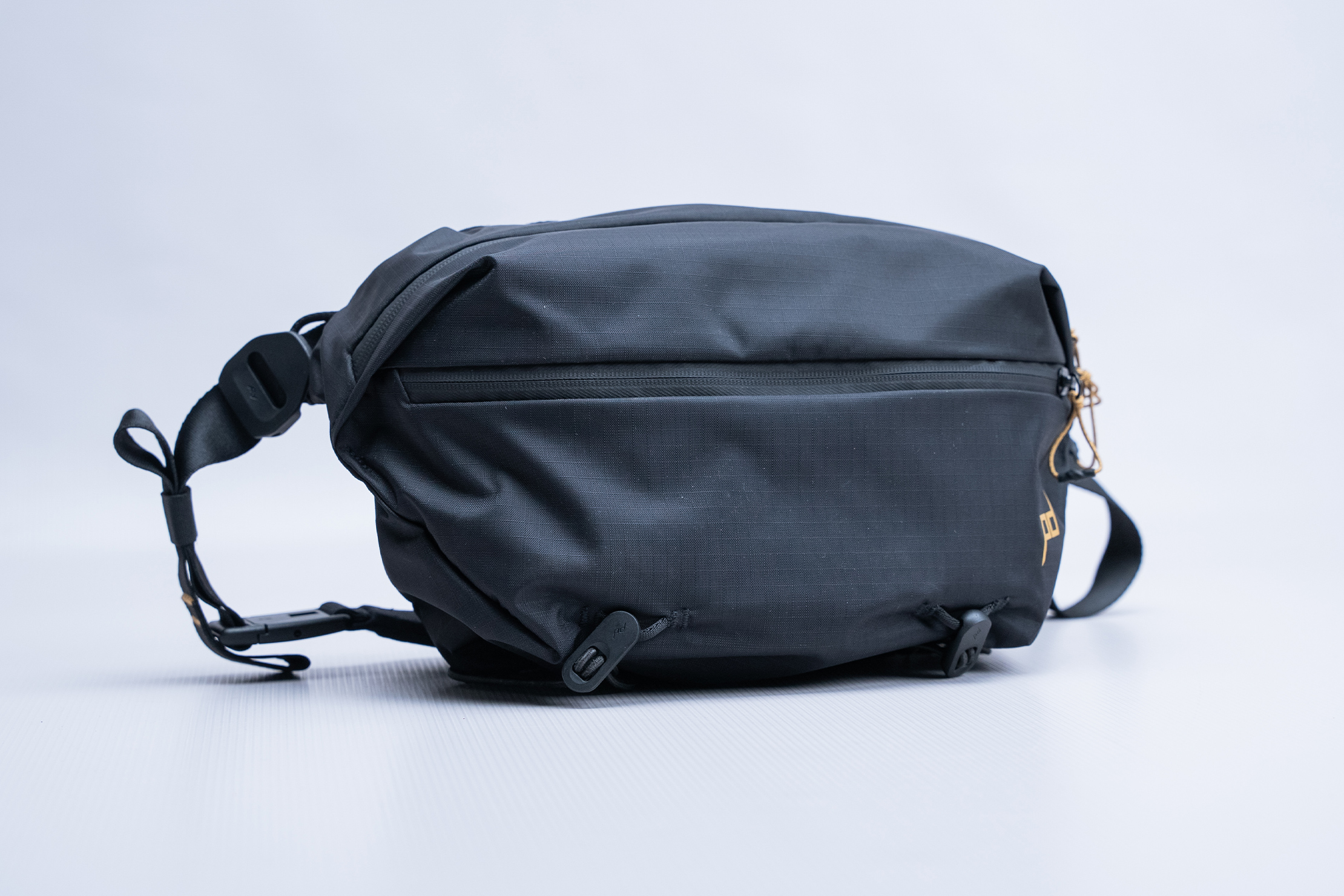
Well, we’re glad that you asked. There are gear loops on the bottom of the sling, which do most of the lifting here. You can use these to attach additional gear to the sling, like a tripod, or you can use them to compress the bag. It doesn’t do super well at both things simultaneously, but we shouldn’t get too greedy. Utilizing the gear loops, you can cinch the pack down a ton, making the materials much more manageable when the sling has less gear inside.
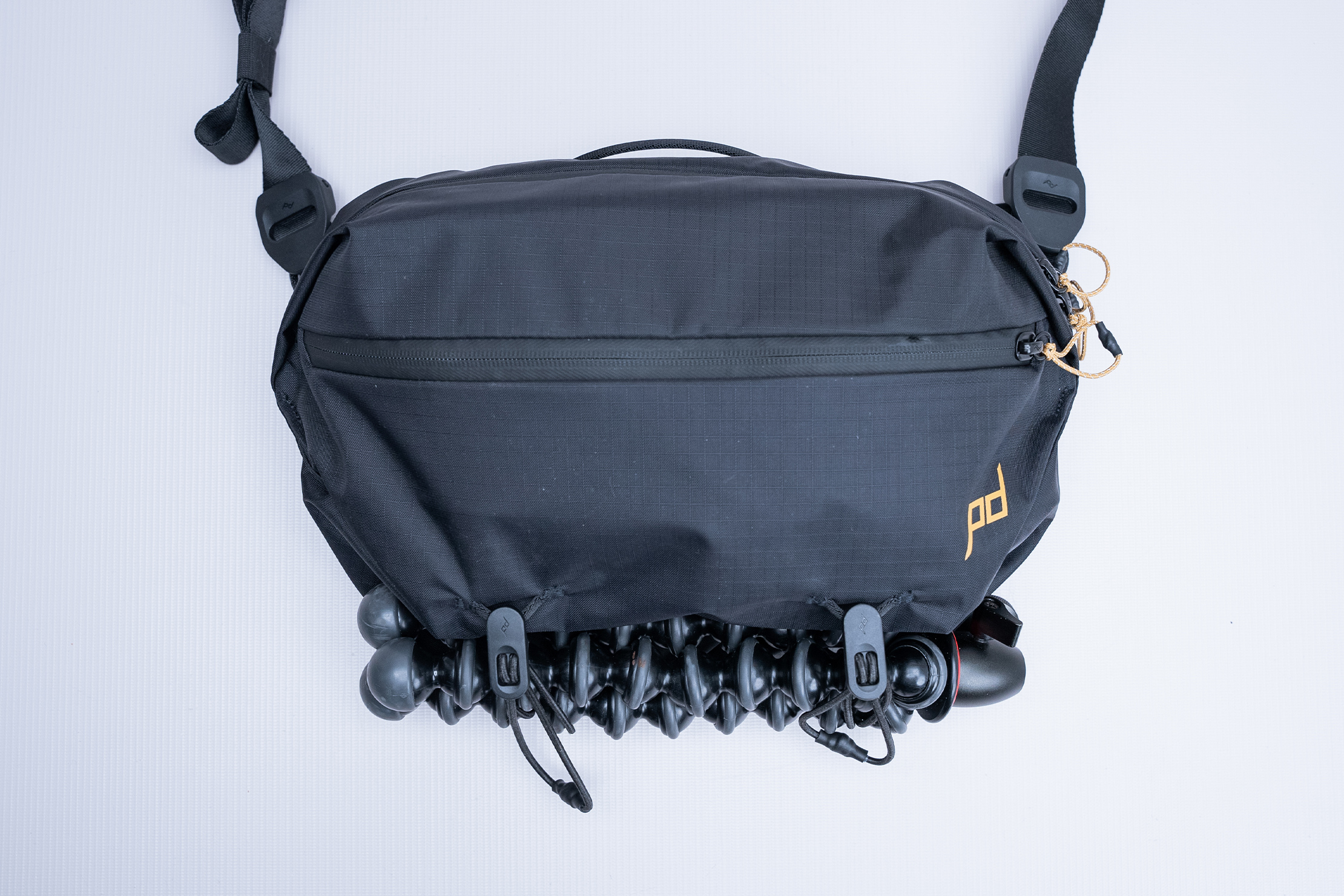
There’s a hidden pocket on the backside of the sling, which we’ll get into, but we’ve got some additional attachment loops here, too. You can attach gear loops to hook the sling onto the exterior of another bag, which is helpful in transit. Sometimes, you only want to carry your backpack and nothing more. This makes that possible without wasting space inside your travel backpack or daypack, which works nicely for trips to the airport.
There isn’t a ton going on around the exterior of the sling; however, we think it looks sleek, especially the black colorway. They’re both nice, but if you know Pack Hacker, you know we love black colorways!
Fit Notes
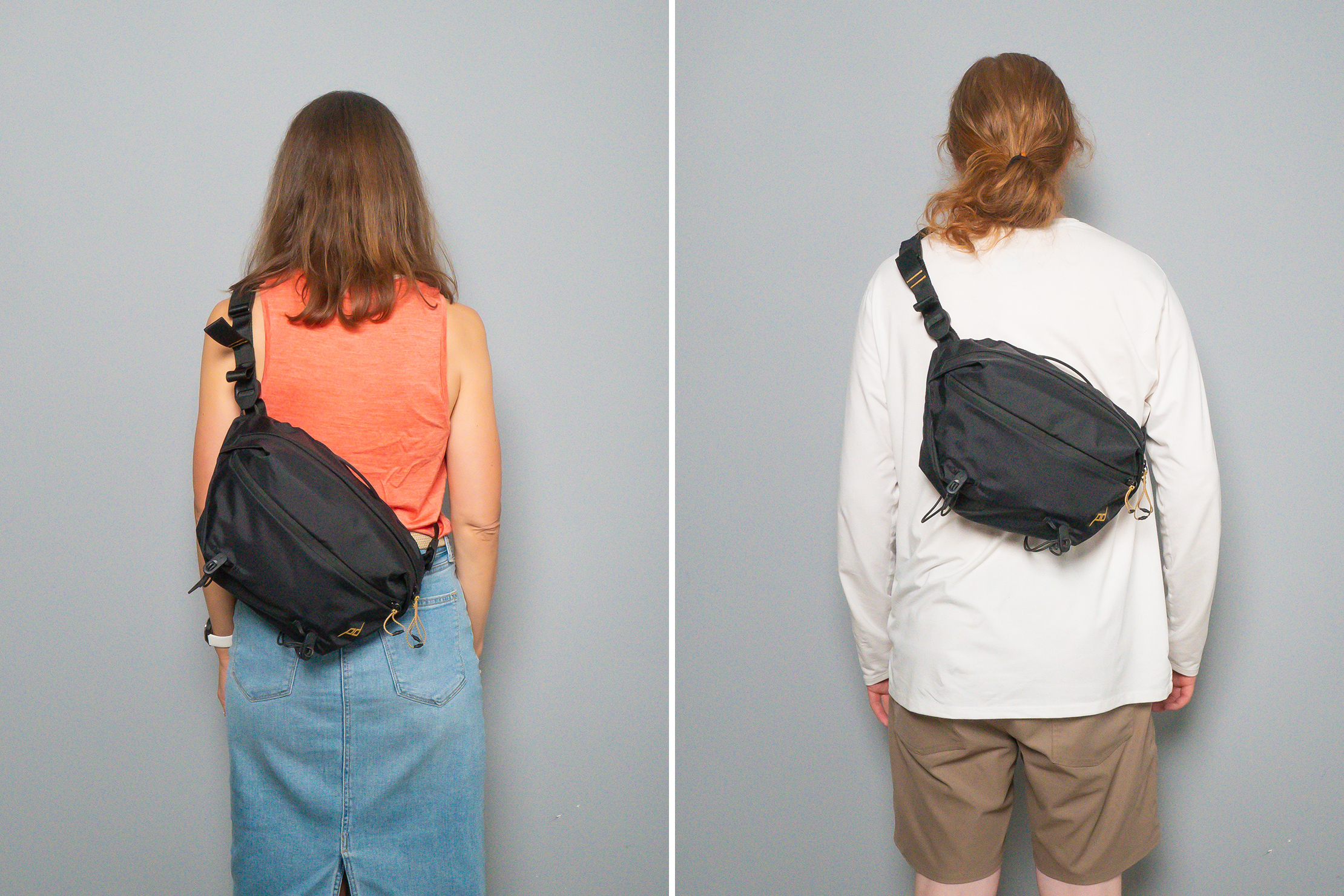
The back panel is well padded but not so thick that it negates the thinness of the rest of the sling’s materials. It’s aerated and exceptionally breathable, too, which is handy for warm climates. The back panel is malleable but comfortable, which is a solid juxtaposition.
The strap is well padded and breathable, which we like for more active adventures, like cycling or running. The strap is ambidextrous, so you can ensure that the area you want to be padded remains comfortable. The area with padding doesn’t move, though, so you can’t be as precise with your adjustments as you can with other sling bags. In order to adjust its location, you have to unhook a clip that locks the strap in place, add or remove length, and clip it again—then repeat until the padding is where you want it. While this allows you to find the right placement, it’s a tedious process that isn’t easy to do on the fly, especially if you like frequently switching your sling from front to back, as the padding won’t stay centered in your shoulder without that adjustment. The extra strap is handled by strap keepers and a storage area behind the back panel, which is handy for ensuring the bag looks sleek. Nobody wants extra materials all over, after all.
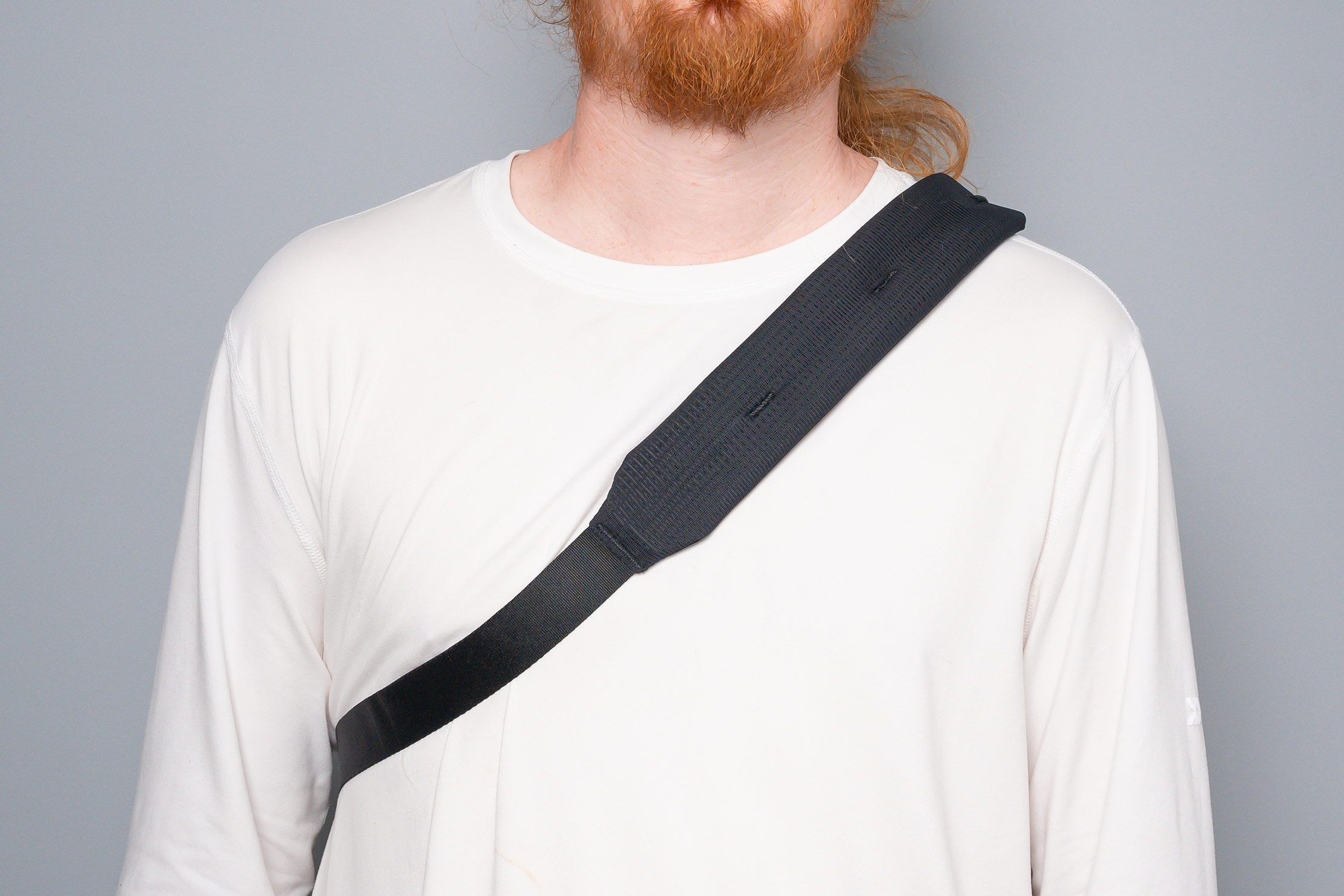
An included crossbody stabilizer strap ensures the sling doesn’t slide around when moving quickly. This makes it slower to take the sling off; however, we appreciate how easy it is to attach and remove. Plus, it makes the sling feel more secure while cycling or hiking.
The release buckle is easy to use and is in the center of the strap, making it easier to doff, especially when you’ve got the sling on your back.
The strap has a small loop for attaching gear near the buckle, which is handy for outdoor adventures. You can attach sunglasses or modular gear here. It doesn’t get in your way if you don’t want to use it, which is how we prefer extra features to be.
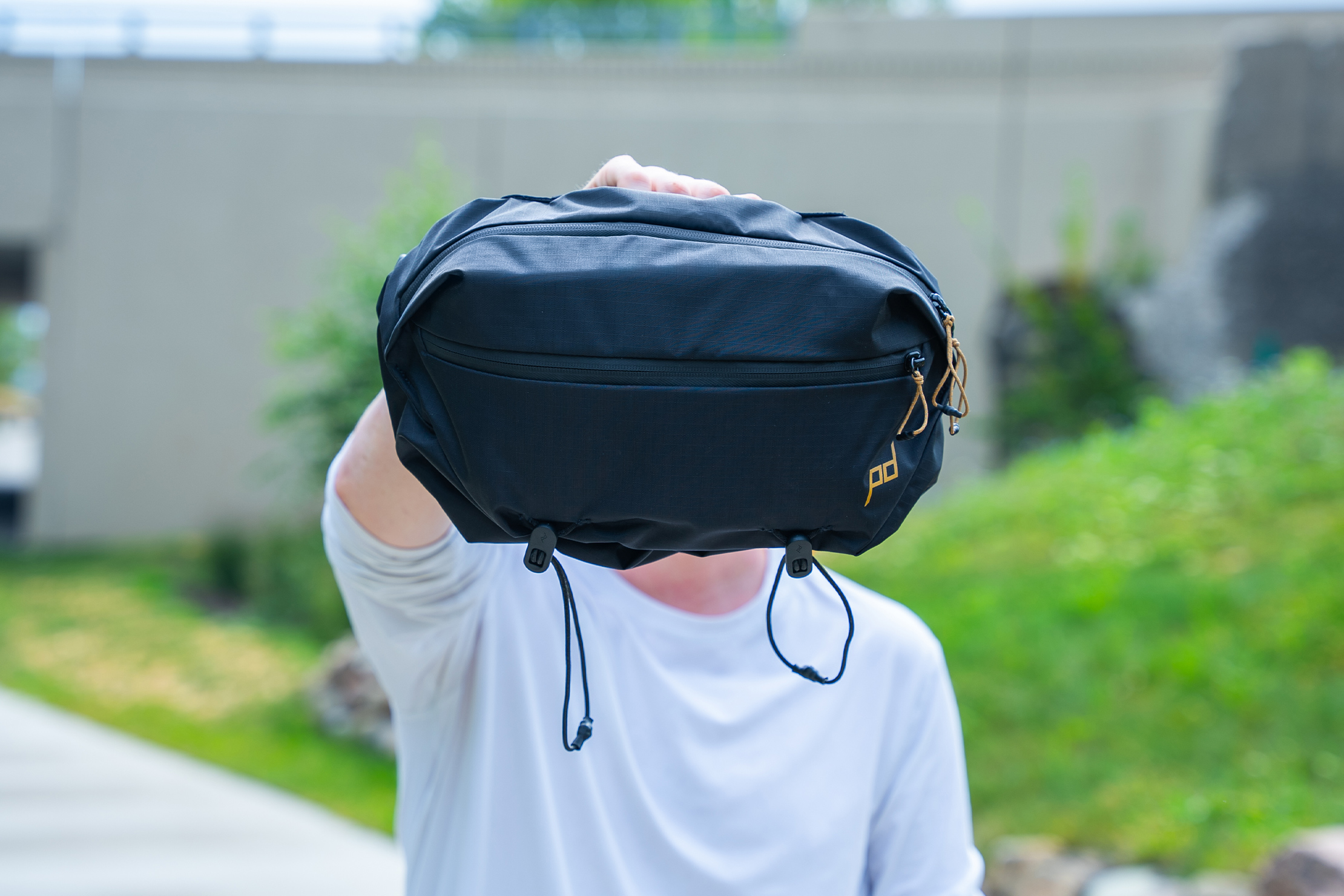
You can wear this pack as a waist bag; however, it isn’t as intuitive as when used as a crossbody. However, we dig that you have the ability to wear it like that, and it performs quite well as a bum bag.
Inside The Sling
The hidden pocket on the backside of the sling is secured with magnets. Because the closure doesn’t completely cover the pocket entrance, it isn’t water resistant. Still, our phone was dry even after a walk in the rain. This is a solid place to stow valuables like a phone, wallet, or passport while you’ve got the sling on; however, it’s straightforward to access if you’ve got the sling sitting on a table or the ground, so keep that in mind. Additionally, whatever you stow here can affect comfort, as it butts up to the back panel. Larger items can be uncomfortable, but flat items do well here.
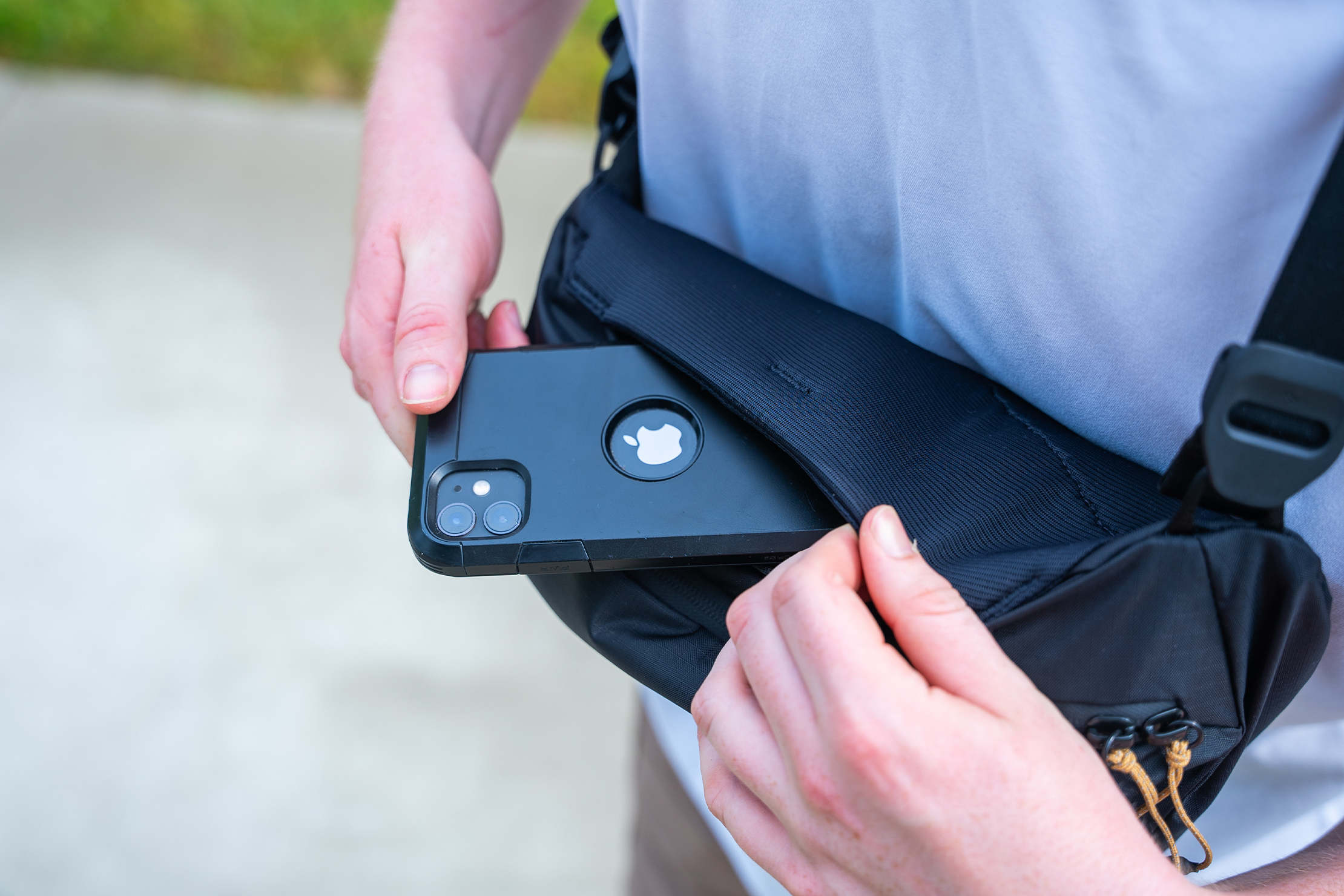
The front pocket lacks organization but has significant space to stow gear. There’s a key leash, which is stretchy but doesn’t feel very durable. We’ve had no issues with it over two weeks; however, we’re curious what it’ll look like in two years. This pocket is the easiest to access while wearing the sling, so it’s a solid place for quick-use items like a wallet, snacks for the trail, or headphones to make a call without bothering people around you.
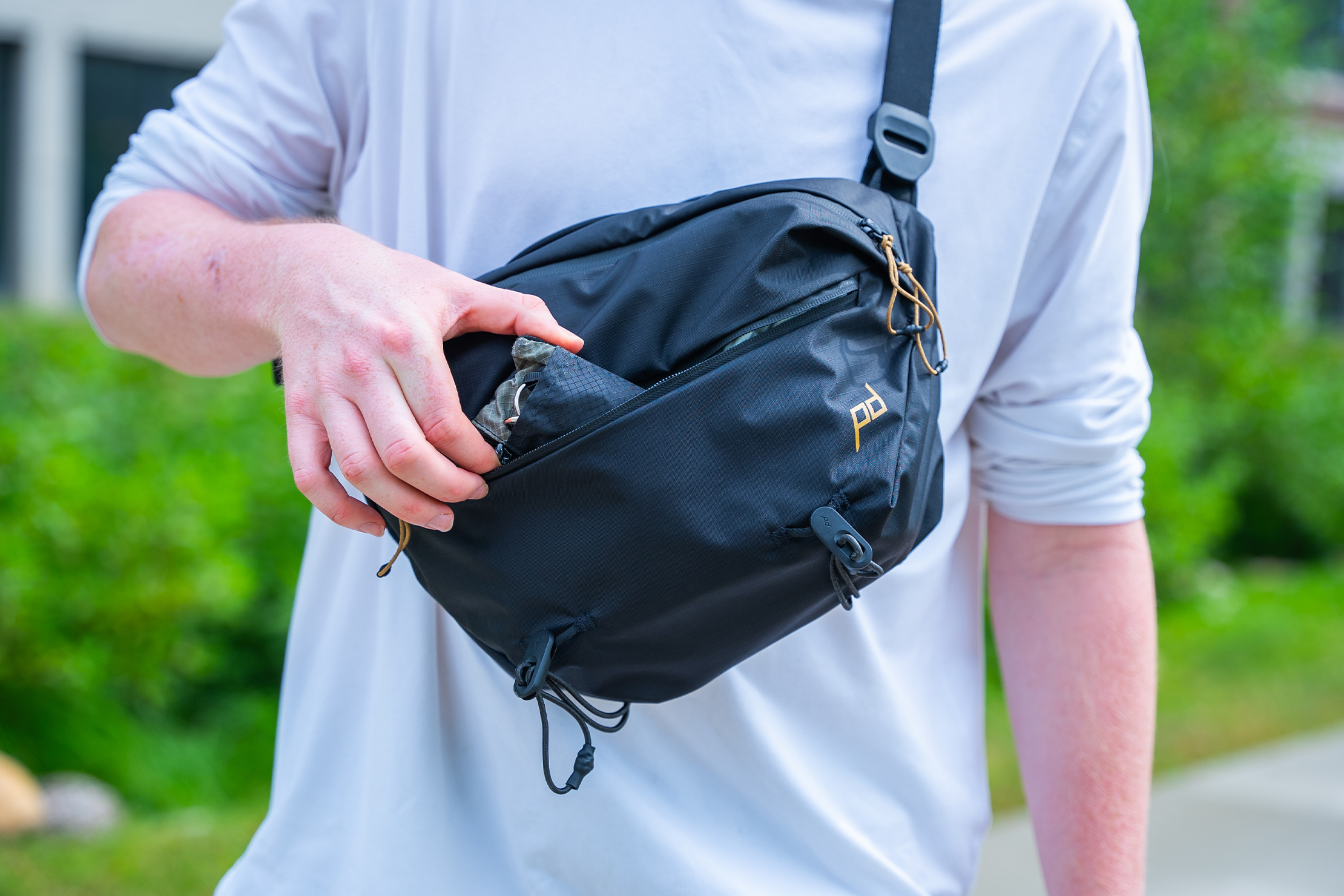
You can use the main compartment in one of two ways. Your first option is with Peak Design’s Extra Small Camera Cube (V2), which was designed to be used with this sling. Essentially, the cube fits snugly inside the sling, making it easy to use as a camera bag. The cube adds structure and padding to the sling, making it a safe place to stow your expensive gear. Depending on the camera you’re bringing, you should be able to fit a camera and a small lens. If you have a more petite body, like a Micro Four-Thirds Camera, you might be able to accommodate an additional lens. When in use with the camera cube, you can’t really fit anything else in the main compartment, so keep that in mind. You can still use the front and hidden pockets; however, there isn’t much extra space in either.
The second way you can use this sling is as-is, which is how we expect most of you will use it. However, to be compatible with the camera cube, we may have less organization than you’re used to from a Peak Design sling. Essentially, it’s a large dump pocket with pockets on the backside.
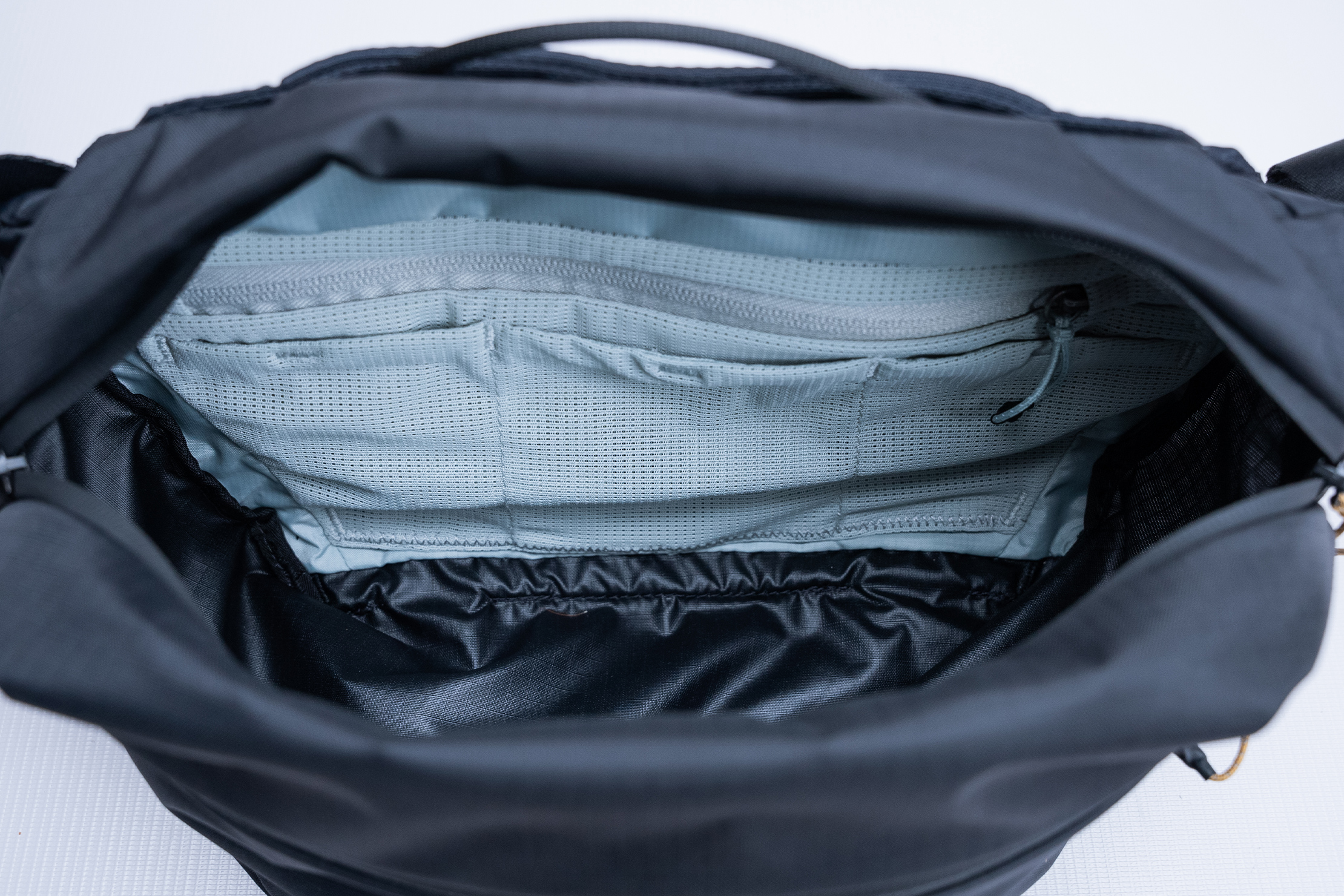
First, there’s a large zippered pocket crafted from mesh. Inside are four smaller mesh pockets that work well for little gear, like SD cards and other accessories. There’s enough room for more oversized items inside this area, like a battery bank, passport, or hard drive. Three more larger liner pockets are outside the zippered compartment, ensuring they can hold more significant items like a wallet, some phones (when stowed vertically), and smaller external hard drives, like the SanDisk Extreme Portable SSD. You can’t easily access (or overstuff) this organization when the camera cube is in place, so keep that in mind.
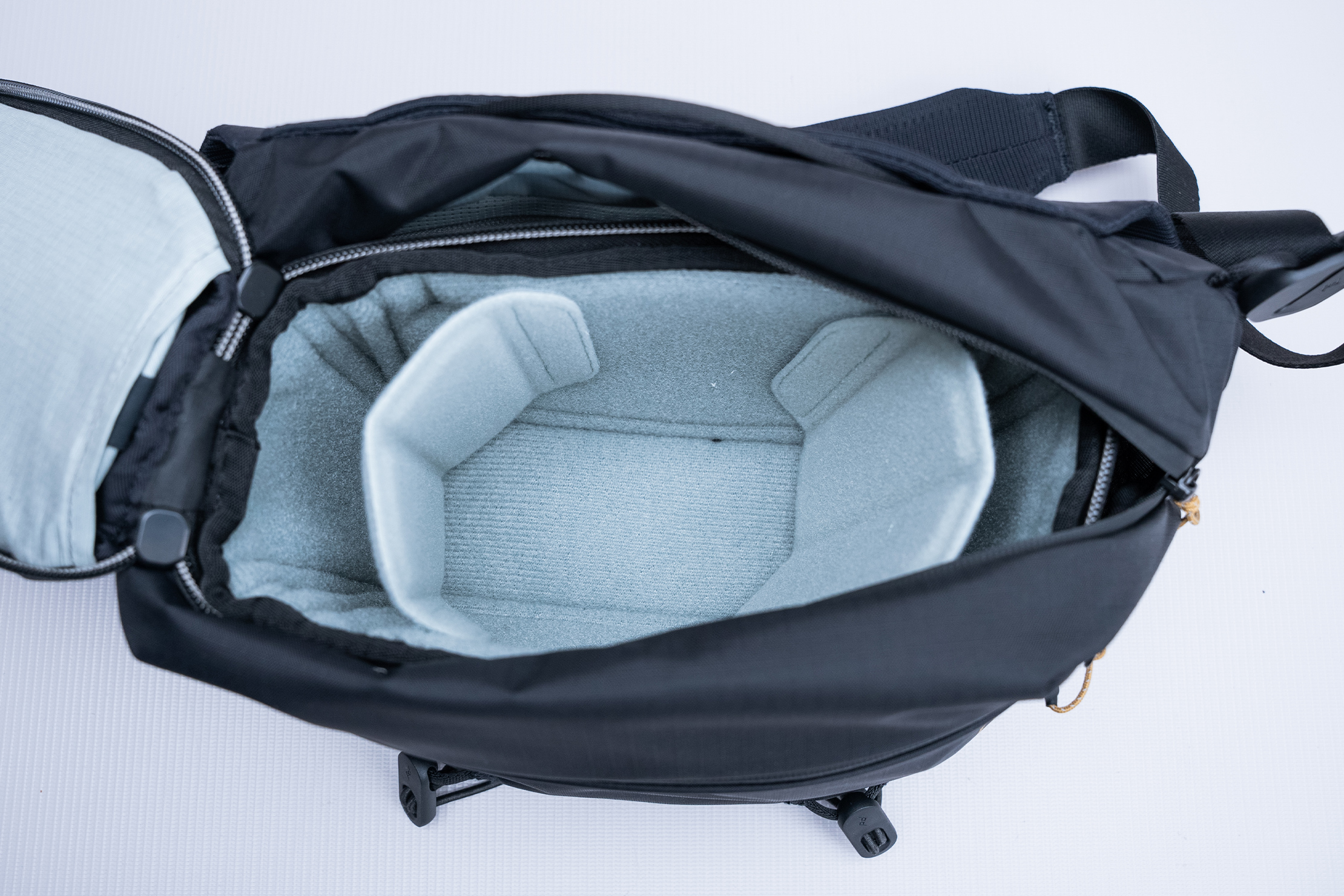
The rest of the space inside the sling is open for your interpretation. You can still use the organization when the camera cube is inside. Still, it’s very challenging to access, so we wouldn’t recommend placing things there that you’ll need frequently or in an emergency, like a phone or an inhaler.
Essentially, this bag has two modes. First, there’s the structured, camera-sling mode. In theory, you can use the camera cube to stow other items; however, that likely isn’t your best use of space. Next, there’s the compressible mode. The materials lack structure and are easy to pack; however, they can look saggy when packed with less gear, even when compressed using the bottom straps.
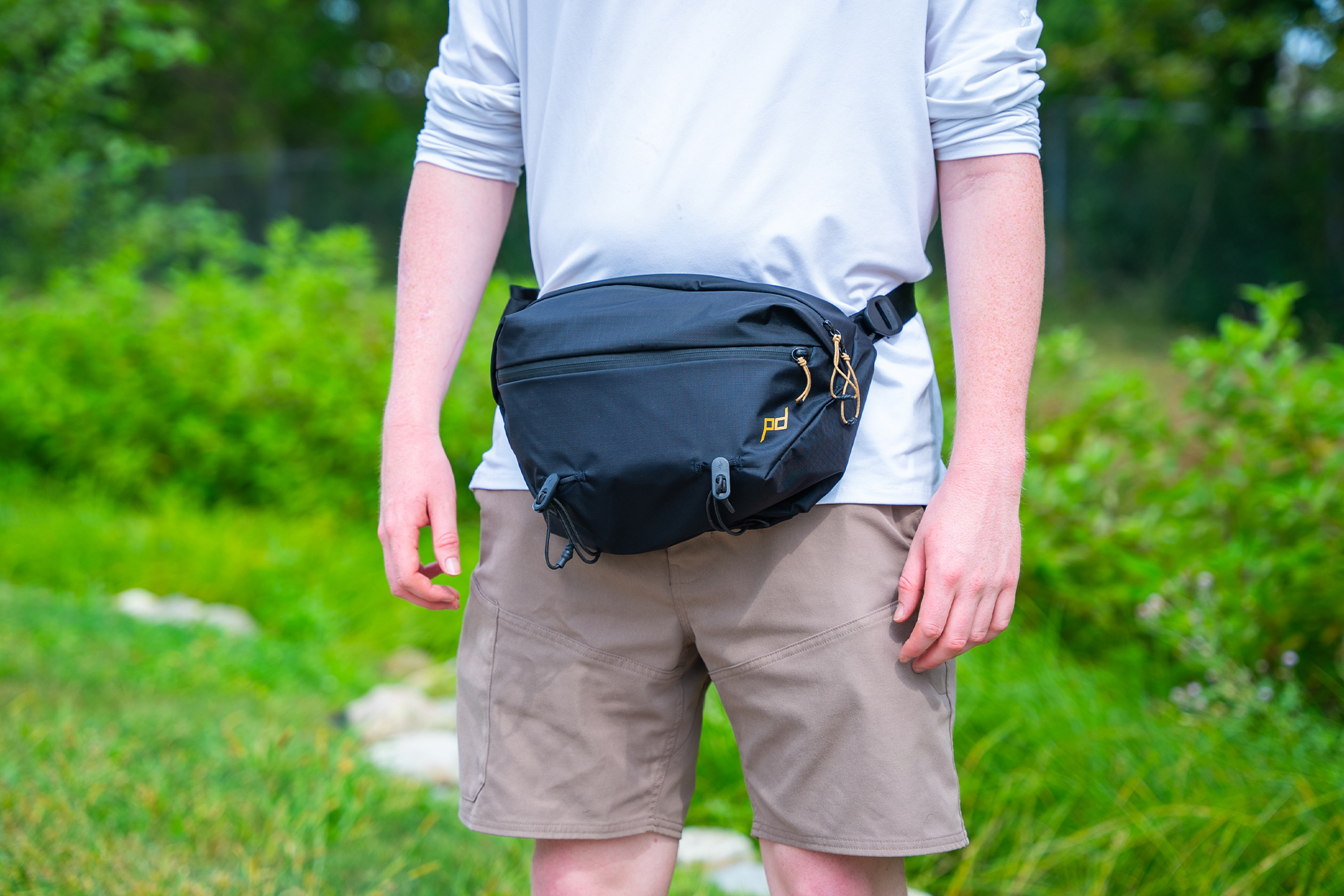
Overall, we dig the versatility of the Peak Design Outdoor Sling 7L, but we understand that just because it can do a lot of things doesn’t mean that most travelers need the features it offers. Still, it’s somewhat budget-friendly, highly durable, and works as a standard sling or a camera bag, which is worth commending.
Usage Timeline
Condition: Excellent
- We’re loving how lightweight it is compared to similarly sized slings
- We’re curious about how water-resistant the materials are for keeping our gear dry
- No issues with the harness system yet, but we’ll put it to the test
Condition: Excellent
- The materials have held up without issue, even after falling off a bike
- No issues with the unbranded zippers or any of the hardware
- It can be challenging to get the strap fitted correctly; however, it’s comfortable and customizable







Get your questions about the Peak Design Outdoor Sling 7L answered from our team and the Pro Community right here on the page. Plus, join discussions with other members about gear, guides, and more.
Join Pack Hacker Pro or, Sign In